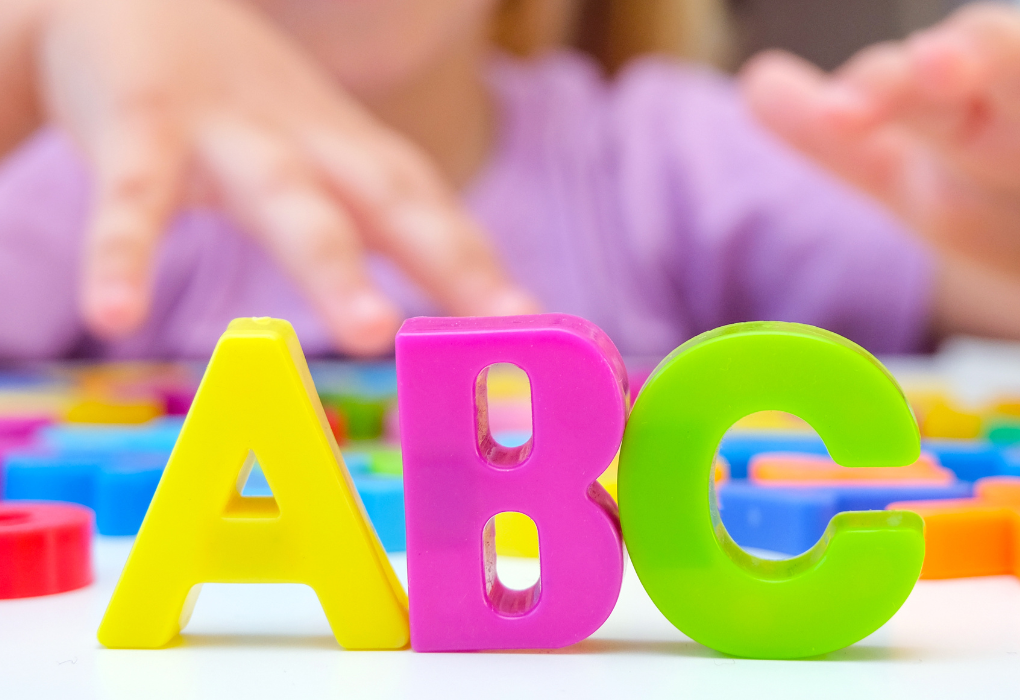Developmental milestones are major when it comes to parenting, and it’s hard to know when or if your mini is hitting them. As we know, there are *so* many to look out for, but Allyson Kempner, New York State licensed and nationally certified Speech-Language Pathologist is here to break down all your FAQs about speech development.
Ally implements a team approach and believes that therapy works best when there is collaboration between teachers, parents, students, and other therapists. She believes that children learn best when they are motivated and engaged. So, if your kiddo is showing signs of speech delay, is coping with their paci for too long or isn’t fully speaking yet, read up on her top tips below.
1. Is it normal for an almost three year old to mostly babble and not fully speak?
At 3 years old, your little one has a vocabulary of around 200 words and speaks in sentences that are around 3 words long. Your 3 year old will also start to use grammatical markers such as; present progressive (adding -ing to verbs), plural s (cups), prepositions (in, on), irregular past tense verbs (fell), and possessive s (Mommy’s). Your 3 year old’s vocabulary will also grow daily and they will start to have a word for almost everything! Your 3 year old will start asking wh- questions (who, where, what, why- “where is mommy?”). Below are some things you can do at home to elicit expressive language from your little one:
- Narrate what you are doing throughout the day
- Expand on your child’s phrase: if your child points to a dog and says “dog,” you can expand on this and say “I see the dog. The dog is drinking water.”
- Read books daily- ask your little one questions throughout the book and talk about the pictures in the book.
- Teach gestures to express more, all done, etc.
- Model language: instead of asking your child questions, you can provide a model and verbalize a sentence to describe your actions or your child’s actions.
2. What age should a child stop using their pacifier to prevent any speech delays?
Pacifiers can affect speech and language development if they are used too frequently and/or for too long. After 12 months old, we tell parents to consider the duration and frequency of pacifier use. Between 12-24 months, we encourage pacifiers to only be used during relaxing times (reading books, nap time, bedtime, long car rides). Therefore, your toddler can babble and talk when active and engage with others. Try to eliminate the pacifier by 3 years old!
3. What are ways to encourage a one year old who is aware and showing a desire to verbally communicate but hasn’t yet?
At 1 year old, we really look at their receptive language. I always encourage parents to model speech and language and to talk about their actions. For example, during bath time you can narrate your actions as you turn on the bath, put soap on their body, and use water to clean. Also, during playtime you can narrate your actions as well as your child’s actions. For example, if your child is playing with a car you can say, “Great job [name]. I see you are pushing the red car. The wheels are going round and round and the horn on the car goes beep. You can make the car move really fast and really slow!”
4. How to know when to worry if your kiddo has a stutter?
As toddlers become more verbal, they might start to stumble over their words. It is not uncommon for young children to repeat words or phrases. You might notice disfluencies when your child is excited, tired or feels rushed to speak. The chart below shows the difference between a typical disfluency that will go away vs. the early signs of a non-typical disfluency that may indicate stuttering.
5. What is the best way to treat Childhood Apraxia?
Early intervention is a great option. Using multi-sensory cueing to treat childhood apraxia of speech is very important! This means using visual cues (using a model or image of how the mouth looks when saying the target sound), auditory cues (a spoken model of the target sound), tactile cues (what the child feels when saying the target sound). During the tactile cues, the speech therapist uses specific hand and finger positions to represent placement, manner, and voicing.
6. How many words should a 1-1.5 year old be producing?
At 12 months, your child will verbalize 1-3 words. It is great to talk to your child and narrate what you are doing to expose him/her to new vocabulary and language. You can narrate your actions during everyday routines such as mealtime, bath time, and bedtime. Routines provide repeated opportunities for learning in a relaxed and enjoyable setting. At 18 months, children verbalize around 20 words, including different types of words (nouns, verbs, prepositions, adjectives, and social words). It is important to remember what counts as a word: parts of a word, exclamatory words (uh-oh, yay), animal sounds, and gestures. If your child is using a word consistently and intentionally, it counts as a word. For example, if your child says “ba” every time he/ she sees a ball, that counts as a word. Also, if your child signs “more” when he/she wants more food, this counts as a word as well! Saying “moo” for cow or “neigh” for horse, also counts as a word.
7. Do toddlers outgrow speech delays?
Yes! Speech and language is such a broad term and can cover receptive language, expressive language, social language, articulation and literacy. Early intervention is super important !If your 2 year old is not following 1-2 step directions, I would definitely reach out to schedule an evaluation. If your 2 year old is not verbalizing at least 50 words, I would also reach out to schedule an evaluation! If your 3 year old is not verbalizing 2-3 word phrases, reach out! However, if your 2 year old cannot say the “r” or “l” sound, do NOT reach out for speech therapy. “R” and “L” sounds are later developing sounds that children master around 6-8 years old!
8. Can tongue ties increase speech delays?
A tongue tie does not necessarily cause speech problems. However, difficulty with coordination of tongue movements can cause unclear speech. A speech therapist can work with your child to provide strategies to help articulate specific speech sounds.



